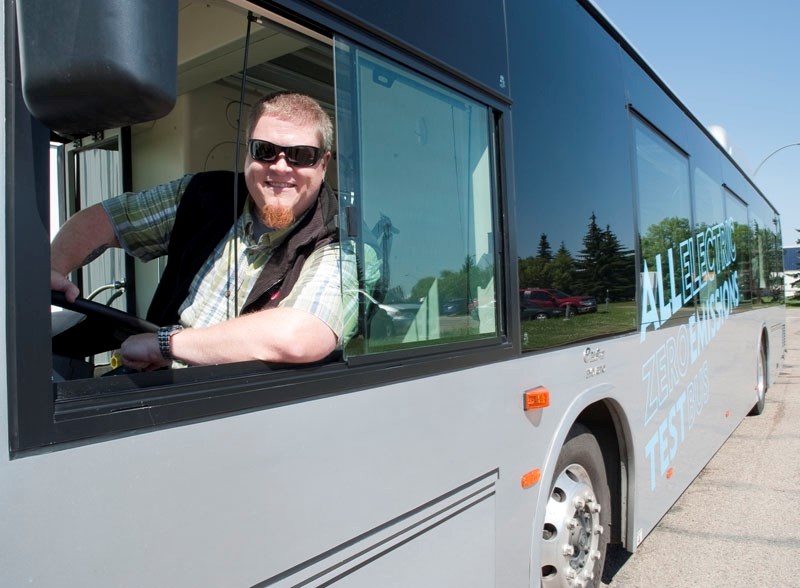St. Albert has become one of the first places in Canada to add an electric bus to its transit fleet.
City council announced this week that it had purchased three long-range battery electric transit buses for its transit fleet. The actual decision was made during the in camera portion of the Feb. 22 council meeting.
Council decided to pursue the purchase last August after hearing the results of the city’s August 2014 and March 2015 electric bus trials. The trials found that the buses were about five times more energy efficient than conventional diesel ones, produced about 51 per cent fewer greenhouse gas emissions, and were significantly cheaper to operate.
Each 35-foot bus cost $980,000 for a total of $2.94 million. Two-thirds of this cash came from the province’s GreenTRIP program, meaning that the city is paying about $323,400 per bus, reports city transit director Kevin Bamber.
GreenTRIP doesn’t normally fund replacement buses, but the city won the Capital Region Board’s support for this grant because the buses were electric, said Mayor Nolan Crouse.
Getting that provincial grant was a big factor in making this decision, Crouse said.
“The payback is long if you don’t have capital to supplement it.”
These buses will produce less noise and air pollution in operation than diesel buses and will be less expensive to maintain and run, Crouse said. They can also charge at night during off-peak hours when power is cheaper.
“They have a positive impact on the environment.”
While other Canadian cities have electric buses in their fleets, those are all test models rented or leased from manufacturers, Bamber said. St. Albert is likely the first place in Canada to actually buy an electric bus for its fleet and the first to buy this particular model.
While the city initially planned to buy four buses, Bamber said his office had to drop one of them due to falling exchange rates.
The bus in question is made by BYD Coach & Bus Ltd., which also made the bus the city tested in 2014. It has a top range of about 250 km on a single charge (significantly more than what a St. Albert bus would drive in a day, reports Bamber’s predecessor, Bob McDonald).
The BYD bus cost less and had more range than the New Flyer bus the city tested, Bamber said. The New Flyer bus was meant to charge in the field, and would have required frequent 10 minute charging stops at special overhead charging stations to operate.
The BYD bus costs about $405,000 more than a diesel one without GreenTRIP funding, Bamber said. With the grant, the bus costs about $251,600 less.
The city’s electric bus trials suggest that an electric bus costs about $36,300 less per year to run than a diesel one, Bamber said in an email. That suggests that the buses will pay for themselves in nine years once you account for GreenTRIP funding.
While they haven’t been able to test this bus in -40 C weather, Bamber said similar models have fared well under those conditions in Europe. The buses will also be parked in a heated garage.
The electric buses will drive all the city’s routes and look pretty much the same as the diesel ones, except they’ll be slightly smaller, won’t have a tailpipe and might have some signs advertising their electric nature, Bamber said. They’ll also be a lot quieter, emitting a turbine-like whine instead of a diesel roar in operation.
While the city plans to replace all its diesel buses with electrics within 18 years (the lifespan of a diesel bus), Crouse said council would have to dig deep to do so come budget time if there’s no GreenTRIP cash available.
“I guess we’ll kick the tires, no pun intended, this fall.”
Bamber said the buses should arrive by this fall and be on the road before the end of the year.




